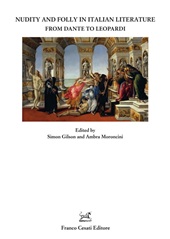Nudity and folly in italian literature from Dante to Leopardi
304 pages
Includes bibliographical references and index.
Since antiquity, folly, nudity, and poetry have been strictly associated with truth, goodness, and divine ecstasy. The concept of poetic creation as a form of divine ecstasy, or furor, is at the heart of Plato's Phaedrus, where poetic manìa (madness) is allocated the status of divine madness, along with its prophetic, mystic and amorous counterparts, with the latter, the madness of love, enjoying the highest status among all four. Throughout the pre-modern era, scholars committed to the study of the writings of Plato and Aristotle, alongside Hippocrates, Galen, and Avicenna, have all focused on the link between genius and folly, madness, and melancholy.
From a Christian perspective, even though the Middle Ages had placed madness or folly in its hierarchy of vices, the most exemplary figure in early modern Italy who had acted foolishly and made use of nudity for Christ's sake is Saint Francis of Assisi, also known as God's Fool. Nearly three centuries after Saint Francis's evangelical approach to embracing “the nakedness and shame of the Passion,” Desiderius Erasmus, echoing passages in Saint Paul, gave voice to a sublime celebration of folly as the mask Christ himself used to convey his spiritual message, as well as asserting that “only fools have a licence to declare the truth without offence”.
With these considerations in mind, the twelve chapters in this volume aim to present original research perspectives, from Dante to Leopardi, exploring how nudity and folly have been drawn upon to consider the ambiguity implicit in the notion of truth when used to address historical, philosophical, political, religious, scientific and social discourses that are still very much relevant in our modern and contemporary world [Publisher's text].
Collected essays.
-
store_in_this_m
-
information
isbn: 9788876679544
SUBJECTS
- Italian literature -- History and criticism
- Nudity in literature
- Folly in literature


